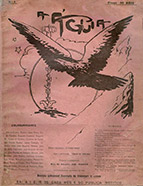

................................
In this work (November 1920), a version of a speech delivered at Santiago de Chile’s Municipal Theatre to mark the fourth centenary of Magellan's voyage, Oliveira expresses his interest in the history of civilisation, specifically in tracing the origins of a noble race and celebrating a glorious past filled with heroes. Like many other authors, some mentioned here, Alberto d'Oliveira, imbued with a messianic fervour, argued that no event in the "collective history of Humanity" held greater significance for the "march of civilisation" than the Discoveries undertaken by the "Navigators and Conquerors of the New Race." He describes Iberian heroes, including Christopher Columbus, Albuquerque, Cortez, and St Francis Xavier, as embodying courage, faith, creativity, tenacity, and "genius intuition" ( Idem, Issue 109-111, January-July 1921).
There are notable affinities among the figures mentioned above. Although often lyrical and literary in his treatment of Iberian themes, such as Iberianism and Iberian relations, Teixeira de Pascoaes, like Ribera i Rovira, invoked an "Iberian Soul" and rejected Castilian centralism. Given his travels to Spain and his correspondence with numerous Spaniards, it is known that he was closely connected with prominent Galician and Catalan intellectuals, as well as authors like Miguel de Unamuno, whom he also referenced in A Águia and the book Por Terras de Espanha e de Portugal [Through Spain and Portugal] (1911). It is notable that Rovira’s ideas resonated with other Portuguese writers, including Alberto de Oliveira. In Portugal y Galicia, nación, identidad étnica, histórica literaria, filológica y artística [Portugal and Galicia: Nation, Ethnic Identity, Literary, Philological, and Artistic History] (1911), Rovira highlighted the affinities between Portugal and Galicia, describing these regions as "artificial entities" unified by shared ethnic, philological, and environmental elements. Alberto de Oliveira, who served as Consul in Brazil and advocated for strong relations between Portugal, Brazil, and Spain, argued in Pombos Correios [Carrier Pigeons] (1913) that it was impossible to justify why Galicia, "as it ought to be, was not a Portuguese province," on geographical, ethnographic, or historical grounds. He suggested that, as mere "adopted children of Castile," Galicians had their true kinship with the Portuguese ( Pombos Correios, p. 8). In harmony with Catalan federalists, Teófilo Braga, who wrote an introduction to Iberisme (1907) by Ribera i Rovira, expressed in his works a vision that combined a sense of homeland with the ideal of a Peninsular and Latin federal republic. He delineated three distinct historical and ethnic identities on the Iberian Peninsula: Portugal, Castile, and Catalonia. Through this network of connections and influences, it is evident that many of the authors who published in A Águia were inspired by an intense interest in the “march of civilisation,” a collective ideal, and the rediscovery of Portuguese (and Iberian) grandeur, all with a view to engaging more openly with the wider world. This sense of openness, intended to echo the expanding horizons of the Age of Discoveries, aligns with Fernando Pessoa’s concept of a “cosmopolitan nationalism,” which he expounded in his A Águia essays — A Nova Poesia Portuguesa Sociologicamente Considerada [The New Portuguese Poetry Sociologically Considered] (April 1912) and A Nova Poesia Portuguesa no seu Aspecto Psicológico [The New Portuguese Poetry in its Psychological Aspect] (published in three parts in September, November, and December of the same year). Pessoa envisioned a nationalism that would liberate Portugal from cultural subservience to foreign influences while allowing it to attain equal cultural and economic advancement. Considering the interest in Iberian federalism shared by these authors — including Pessoa — it is worth stressing that a central motivation for any Iberianist vision was to end the subservience and dependence of weaker nations on those deemed stronger or wealthier.
This work is financed by national funds through FCT - Foundation for Science and Technology, I.P, in the scope of the projects UIDB/04311/2020 and UIDP/04311/2020.
